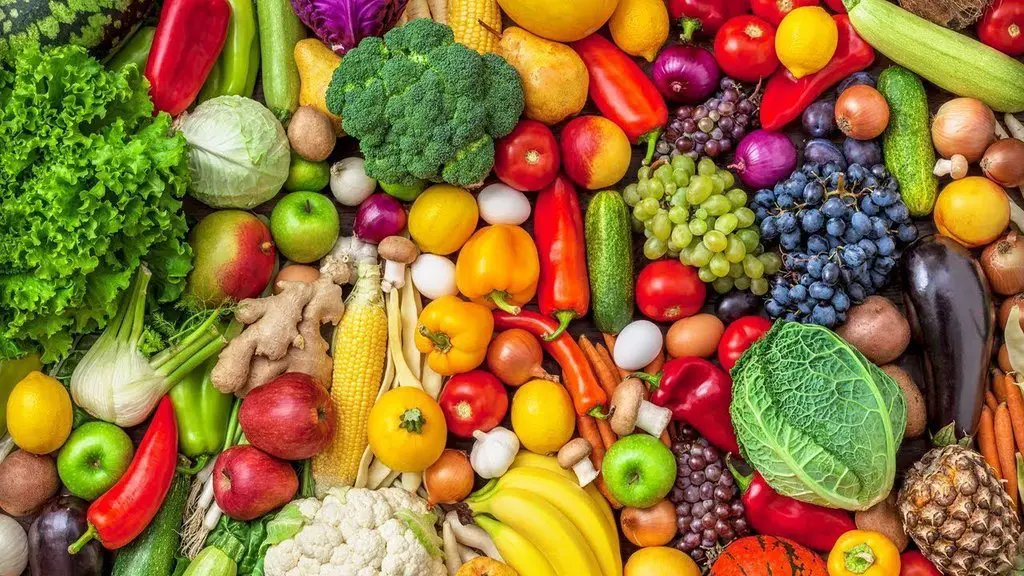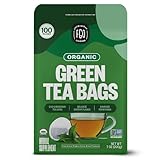When you think of inflammation, you probably imagine the obvious: arthritis, for instance, or an inflammatory disease like IBD. But inflammation is rarely a case of “you either have it or you don’t”. Most of us deal with inflammation on a near-daily basis – we just don’t know it.
Inflammation is capable of affecting the whole body, both on the inside and the outside, and is characterised by a whole host of symptoms. Simply put, inflammation is the body’s response to infection or injury. When a part of your body becomes inflamed, it means something isn’t right, and the body begins to work towards healing the issue.

There’s no denying that inflammation is important, as it’s the first step towards getting better. But symptoms of inflammation, including pain, fatigue, loss of appetite, headaches, swelling, fever and sickness can be unpleasant to deal with. You may also suffer from chronic inflammation, which happens when the body’s inflammatory response is triggered unnecessarily. Chronic inflammation is more serious, and can result in stroke, heart disease, and autoimmune disorders.
Thankfully, reducing or even eliminating inflammation is relatively easy – you just need to know what to do. Our diets can affect our body’s levels of inflammation – the foods we consume can either be categorised as neutral (i.e. they don’t do anything positively or negatively, inflammation-wise) or ani-inflammatory, which means they can help to fight the source of te inflammation from the inside out.
Some of the best anti-inflammatory foods on the planet are as follows:
1. Olive oil
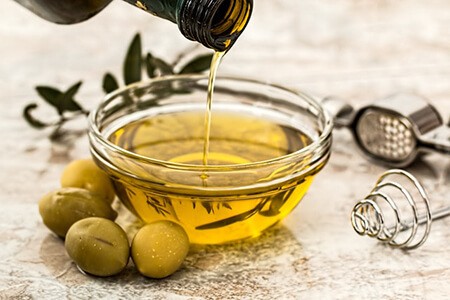
Olive oil is a popular Mediterranean cooking staple, and is considered one of the most healthful foods when consumed in moderation. Opt for extra-virgin olive oil, which is the most potent. It contains oleocanthal, a natural compound that has similar effects to ibuprofen, therefore making it useful as a short-term anti-inflammatory drug.
If you currently cook with vegetable or sunflower oil, switch it for olive oil instead. Olive oil is considered one of the healthier cooking oils, and there’s lots you can do with it. Try roasting your veggies in the oil or using it as a meat marinade. Olive oil is healthiest when it isn’t heated, so you could also add it to your salad dressings or drizzle it onto soups or paellas when serving.
2. Tomatoes
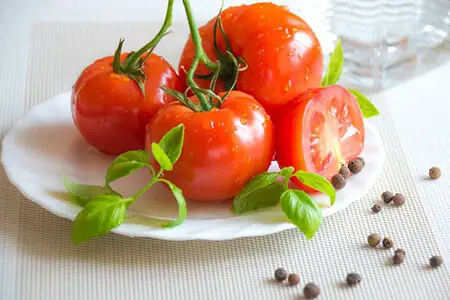
Whether you’re a fan or not, it’s worth adding tomatoes to your diet. They have a high content of vitamin C and potassium, as well as a compound called lycopene. According to research, lycopene exhibits anti-inflammatory activity by targeting certain inflamed immune cells and programming them to die.
Tomatoes offer a myriad of health benefits when eaten raw or cooked. If you’re looking for inspiration, why not add them to salads, pasta bakes or curry dishes? You could also roast and blend them to make a soup or stuff them with rice and veggies and bake them in the oven.
3. Leafy greens
Your school dinner lady was right when she told you that eating your greens would make you strong and healthy! And when it comes to anti-inflammation, leafy greens are your best friend. Greens like spinach, rocket, kale, beet greens and collard greens are packed full of vitamins and minerals, and studies have found them to be some of the most impressive anti-inflammatory foods available.
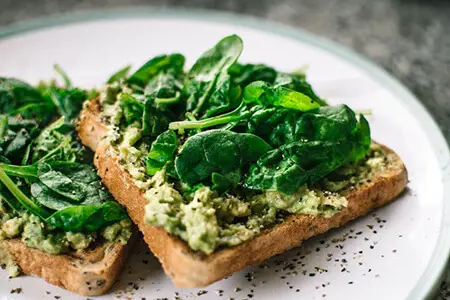
It’s easy to add leafy greens to your dishes, even if you’re not the biggest fan. A good trick is to add them to your curries and hotpots within the last 2 minutes, which will wilt them down so small that you’ll hardly even taste the healthy addition to your dish. You could also blend greens to make a healthy green smoothie or toss them in a tasty salad.
4. Salmon
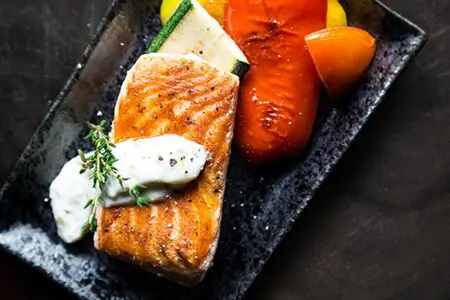
With its high content of essential omega-3 fatty acid alpha-linolenic acid, salmon is one of the best anti-inflammatory foods available. It helps to maintain and improve the health of some of our most important organs, including the skin, brain and heart. In studies of people who required anti-inflammatory medications, omega-3s were found to reduce the dosage of these medications that was needed.
Cooking with salmon is easy once you get the hang of it. If you don’t already have a favourite way of preparing it, try marinating it in a source, like honey garlic or lemon butter, or add it to your breakfast hash for something a little different.
5. Almonds
The majority of nuts are healthy sources of fats, making them effective natural anti-inflammatories, but almonds are the most impressive of them all. They’re packed full of healthy polyunsaturated and monounsaturated fats, while containing almost no unhealthy saturated fats. Almonds are also high in vitamin E, which helps to protect the immune system from free radical damage, thus reducing inflammation.
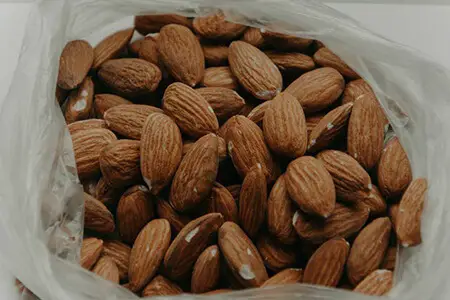
You can enjoy almonds as they are as a healthy, easy snack. If you find them a little boring by themselves, you could always add them to a curry or stir fry, or toast them in a pan and add them to soups, salads and breakfast dishes. Just be sure not to eat too many of them at once, as they’re relatively high in calories.
6. Strawberries
Strawberries are a good source of anthocyanin, which is a type of flavonoid that gives strawberries their deep red colour. Anthocyanins are considered pharmaceutical compounds because of their healthful properties, and, when combined with other phytochemicals found in strawberries, they have potent antioxidant abilities. Strawberries are also rich in folic acid, which is particularly helpful in reducing inflammation in pregnant women.
Like almonds, you may enjoy snacking on strawberries on their own, but they’re brilliant for adding a natural, healthy sweetness to dishes like muesli, yogurt and porridge, too. For something a little different, whip up a strawberry and yogurt smoothie or bake strawberries into a cobbler for a delicious treat.
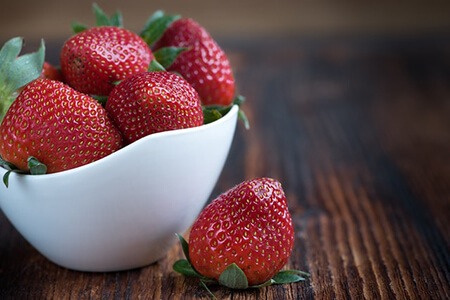
7. Turmeric
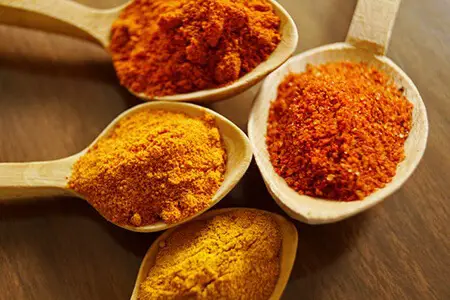
We all know about the incredible benefits of turmeric by now. This superfood, which is usually added to curries and has a distinct orange colour, has been found in a number of studies to have anti-inflammatory properties, thanks to its curcumin content. Curcumin can modify the immune response, helping to prevent inflammation, and has proven particularly beneficial for those suffering from inflammation of the joints.
As with all spices and seasonings, you can pretty much do whatever you like with turmeric. It can be used in a spice rub for grilling meats, or added to soups or curries for flavour. It has a slightly bitter taste, so it’s best to only add a teaspoon at a time. Turmeric is even added to teas nowadays, which are particularly popular in the wellness world. . It works well as a rub for grilling meats, or can be used in curries or soups to add a distinctive Indian flavour. Turmeric tea is also very popular and very easy to make.
8. Beans
Who knew that beans, a staple pantry food, were a source of anti-inflammatory plant protein? Pinto beans, black beans, kidney beans and black-eyed beans are particularly effective, being packed full of B-complex vitamins, vitamin K, and a whole host of healthy minerals. It’s best to cook beans from raw rather than opting for tinned beans, as raw beans tend to be much more nutritious.
You can do so much with the humble bean – and it doesn’t have to be boring, either! Skip the baked beans on toast and add beans to your bakes, pastas, curries, Mexican dishes and salads. Being high in protein, you can use beans as a meat replacement if you’re trying to cut down on your intake of animal products.

9. Whole grains
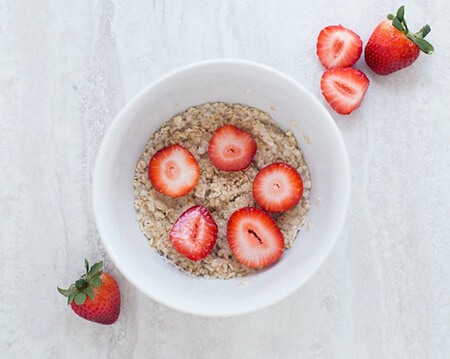
Whole grains contain all three parts of the grain they were derived from, unlike refined grains, which usually only contain one part of the grain. Brown rice, whole grain pasta, and whole-wheat bread are all examples of whole grains, and are much higher in fibre than their “white” alternatives. Fibre has been linked to anti-inflammation in research, and one study found that participants who consumed whole grains saw a reduced number of inflammatory markers as a result.
Of all the foods on this list, whole grains are the easiest to add to your diet. You simply replace your white bread, pasta, rice and noodles with whole grain alternatives. Most of the time, there’s no distinct taste difference between the two, so you may as well make the healthier decision.
10. Ginger
Ginger, a popular Asian cooking ingredient that you probably associate with gingerbread and Christmas, is well-known for its medicinal properties. Gingerol, a compound found in ginger, has been found in studies to have anti-diabetic, anti-obesity, anti-inflammatory, and anti-tumoral effects. It’s no wonder ginger is one of the most popular and effective natural remedies used widely today.
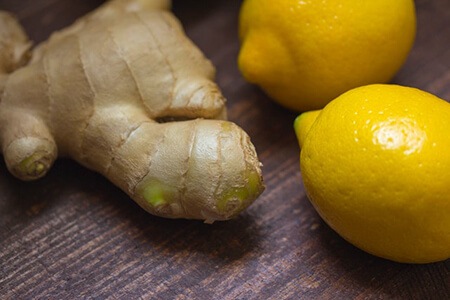
If you love to cook, you’ll find it easy to add ginger to your curries, stir fries, sweet breakfasts and meat dishes. You can also add a thumb-sized piece of ginger to hot water to make a simple ginger tea. This tends to be the easiest way to benefit from ginger on a daily basis.
11. Garlic
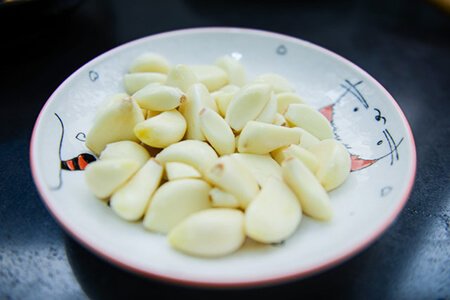
We all love garlic, and what’s even better is that this fragrant vegetable is incredibly good for you. It contains a compound called diallyl disulphide, which can hinder cytokines in their mission to create inflammation in the body. Garlic is highly recommended as an anti-inflammatory food, especially to those who are suffering from arthritis.
You might be that person who loves garlic so much that they add it to every savoury dish they cook. If that’s the case, we don’t need to tell you how to include it in your diet! But if you need a little advice, try roasting it, frying it, including it in oven bakes, or making your own healthier garlic bread.
12. Avocado
Avocados are another food that have reached superfood status in recent years, and for good reason. In terms of nutritional value, they’re very similar to walnuts, which, as we now know, are famed for their anti-inflammatory properties. Being a healthy monounsaturated fat option, avocados contain a wealth of antioxidants and can reduce inflammation effectively.
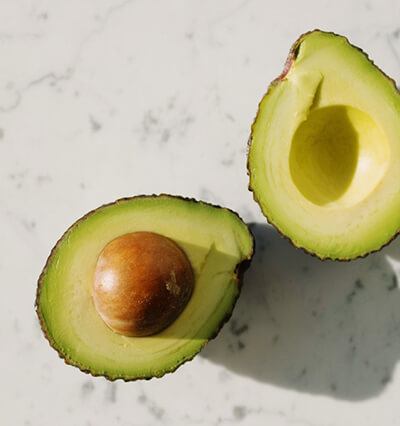
If you want to start your day the right way, why not eat smashed avo on toast for breakfast? You can also make your own guac using avocado and a few other simple ingredients, or add chunks of avo to your salads and even pasta sauces.
13. Blueberries
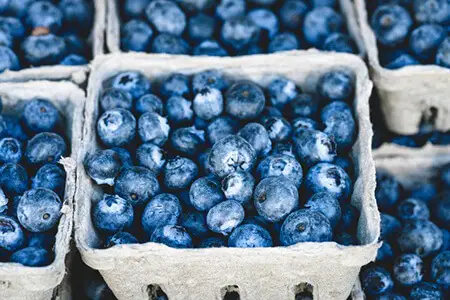
Like strawberries, blueberries are a good source of the anti-inflammatory flavonoid, anthocyanin. They’re also rich in a variety of vitamins that can help to lesson your body’s inflammatory, and chemicals that can regulate the function of the immune system, reducing the risk of chronic inflammation.
You can add blueberries to your sweet breakfasts and healthy desserts, so you can always reach for an anti-inflammatory pick-me-up between your main meals. The internet is packed full of inspiration if you’re looking for blueberry recipes, so search online if you need ideas.
14. Chia seeds
Chia seeds are perhaps the mightiest seeds out there. They might only be tiny, but a single teaspoon of them is incredibly beneficial to brain and heart health. One portion of chia seeds contains a high percentage of your daily intake of fibre, protein, and omega-3 fatty acids, and it doesn’t take a lot to benefit from their anti-inflammatory effects.
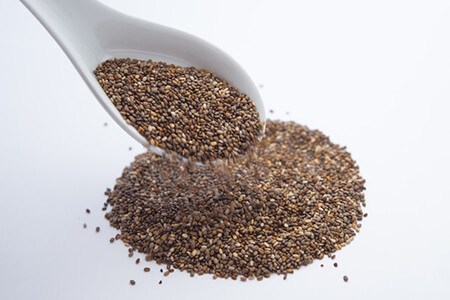
With their unique, nutty flavour, chia seeds work just as well in sweet dishes as they do savoury. Most people choose to sprinkle chia seeds on top of porridge, yogurt, salads and stir fries. You can also make a vegan egg substitute for chia seeds or mix them with milk to make tasty, healthy chia pudding.
15. Green tea
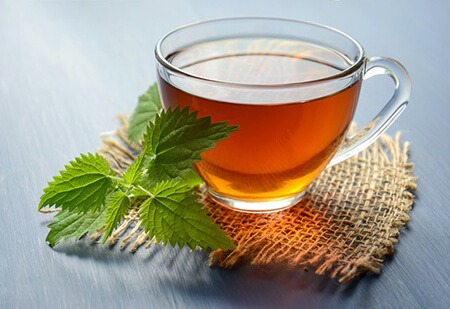
It’s considered the healthiest beverage in the world – we’re talking about green tea, of course. Packed full of polyphenols, which are well-known for their anti-inflammatory properties, green tea is the best beverage to enjoy when you wake up in the morning.
We don’t need to tell you how to make green tea – just swap out your regular breakfast tea for a green tea alternative and enjoy! It’s best to drink green tea exactly how it’s brewed, but you can add a little cinnamon honey to taste if you prefer.
- Delicate Green Tea: 120 green tea bags of Bigelow Classic Green Tea, smooth and delicate signature green tea that is not too harsh or grassy making it delicious and enjoyable as a traditional hot tea or iced tea
- Tea Bags Individually Wrapped: Bigelow tea bags are gluten-free, calorie-free, Kosher Certified and come individually wrapped in foil pouches for peak flavor, freshness and aroma in a drink you can enjoy everywhere you go
- Try A Variety Of Bigelow Tea Bags: There's a tea for morning, noon, and night time relaxation; try Earl Grey Tea, Perfectly Mint Tea, Green Tea, decaffeinated teas, organic teas and a variety of herbal tea bags enjoyed as hot tea or iced tea
- Blended and Packaged in the USA: In 1945, Ruth Campbell Bigelow created our first tea, Constant Comment, a strong, flavorful black tea blended with aromatic orange rind and sweet warming spice; Bigelow is still 100% Family Owned today
- GREEN TEA BAGS - 100 Tea Bags filled with premium green tea.
- ORGANIC GREEN TEA - The tea is blended, filled into tea bags and packed into foil-lined kraft bags in California
- 100 ECO-CONSCIOUS TEA BAGS - Our premium tea bags are constructed of Abacá Hemp Fiber Paper. They are free of dyes, adhesive, glue and chlorine bleach. No staples, strings, bags or extra waste - just delicious tea!
- CERTIFIED USDA ORGANIC & NON-GMO - All our products are certified USDA Organic and certified Non-GMO. Look for the USDA Organic and Non-GMO Project seals on our products!
- TAZO ORGANIC ZEN GREEN TEA: This tea offers a blend of green tea, lemon verbena, crisp spearmint leaves, bright lemongrass, and natural flavors as a tasty, relaxing, and calm refresher
- WHAT YOU'LL GET: TAZO Organic Zen Green Tea, non-GMO and kosher certified, 16 tea bags per pack
- WAKE UP WITH TAZO: Organic Zen Green Tea offers a caffeinated, unsweetened green tea that is best enjoyed hot in the morning or afternoon for a refreshing infusion of green tea
- EASY TO MAKE: Bring fresh water to a boil at 212 degrees Fahrenheit for five minutes without sugar, pour eight fluid ounces of water over the tea bag, and let it steep patiently for a perfect brew
- WHOLE LEAF TEA: Oi Ocha Green Tea is brewed from first flush whole green tea leaves grown in Japan not from tea powder or concentrate; using the whole leaf means our teas don’t lose any of the health benefits that are naturally present in green tea leaves
- CLEAN AND REFRESHING: Oi Ocha Unsweetened Green Tea has is natural clean tasting and refreshing; putting our iced green tea in a convenient ready to drink bottle means you can have your hydration on the go; it makes a great alternative to traditional sodas
- LOW CALORIE: ITO EN's Oi Ocha Green Tea has no sugars or artificial sweeteners, making it a delicious, substitute for your usual sugary soda or flavored coffee at only 5 calories; try our naturally vitamin and antioxidant rich tea, and you may never look back
- ANTIOXIDANT RICH: brewed from premium Japanese loose tea leaves, Oi Ocha provides natural catechin tea antioxidants and other healthy goodies; a key to good health, happiness, and wisdom, green tea is the perfect refreshment for your health and well-being
Conclusion
We’ve only featured the anti-inflammatory foods on this list, but are there any you should avoid? Generally, you should reduce your intake of foods that are high in sugar or salt, or those that are highly processed. Avoid processed meats, which are packed full of saturated fats, as well as whole milks and cheeses, butter, and fizzy drinks.
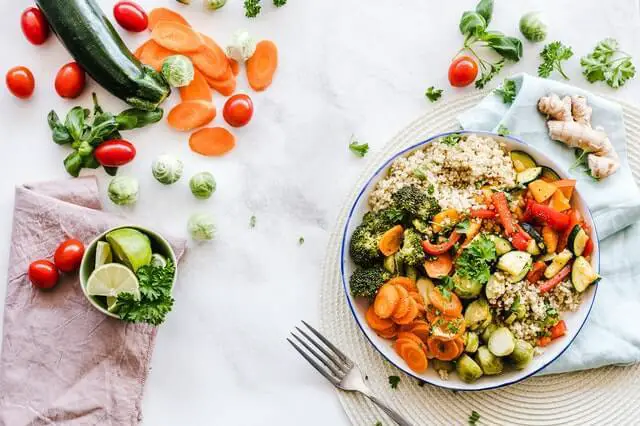
Ultimately, switching out your foods for anti-inflammatory alternatives can greatly reduce your risk of disease and help you to stay at the peak of health. If you’re keen to live the longest, happiest life possible, following an anti-inflammatory diet is the way forward.

